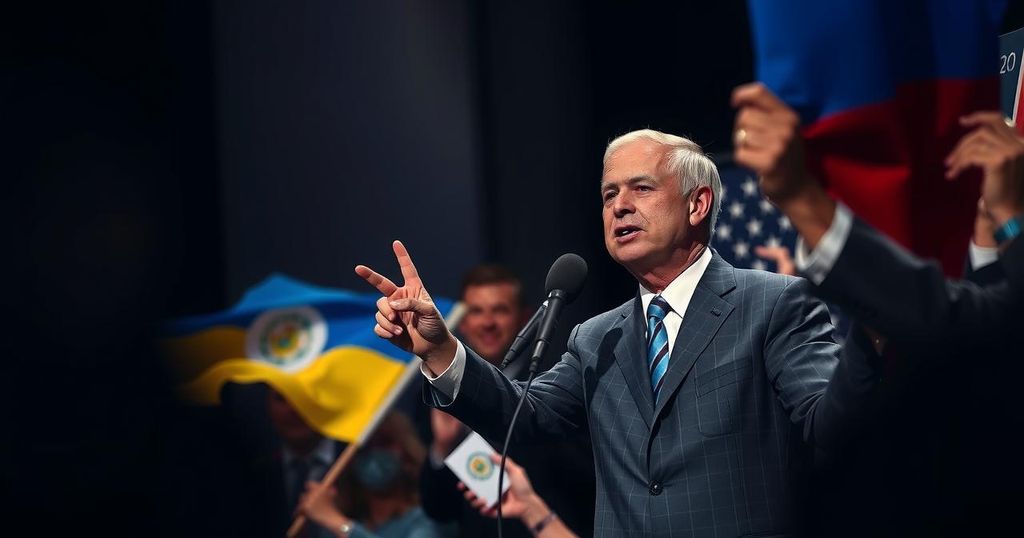Politics
ALVARO DELGADO, ARGENTINA, ASIA, ATLANTIC, BROAD FRONT, COLORADO PARTY, CUBA, DELGADO, DEMOCRACY, ELECTIONS, FRONT, JOSE MUJICA, LATIN AMERICAN, LUIS LACALLE POU, MEXICO, NATIONAL PARTY, NORTH AMERICA, OR, PHILIPPINES, POLITICS, PRESIDENTIAL ELECTION, PRESIDENTIAL ELECTIONS, SOUTH AMERICA, TRADE RELATIONS, URUGUAY, VENEZUELA
Isaac Bennett
0 Comments
Uruguay’s Presidential Run-Off Reflects Democratic Values and Stability
In Uruguay’s presidential run-off, conservative Alvaro Delgado faced off against leftist Yamandu Orsi in a race underscored by democratic coexistence. The candidates, emerging from the October general elections, focused on economic issues, with both pledging to respect the election results. The political atmosphere was notably tranquil, especially compared to other Latin American countries, showcasing Uruguay’s commitment to stable democratic practices.
In Uruguay, a recent presidential run-off election showcased the significance of democratic values, contrasting sharply with the political turbulence observed in several Latin American nations. Conservative candidate Alvaro Delgado faced leftist contender Yamandu Orsi in a tightly contested race following their emergence from the October 27 general elections. While Orsi commanded 44 percent of the initial votes, he fell short of the 50 percent majority required, leading to the run-off against Delgado, who received 27 percent initially and sought to capitalize on third-place votes that favored conservative policies.
Both candidates highlighted economic revitalization as a key focus of their campaigns. Orsi, a seasoned history teacher, advocated for wage increases for low-income workers, underlined by his rallying cry of “We know how to achieve.” Delgado, a former veterinarian, positioned himself as a reformer intent on optimizing government operations and enhancing trade partnerships, particularly with China. In this serene electoral atmosphere, both candidates expressed their commitment to upholding election outcomes and maintaining cooperative governance.
Orsi received backing from revered former President Jose Mujica, a prominent figure known for his unpretentious lifestyle and resilience during Uruguay’s dictatorship era. Conversely, Delgado is stepping in to represent the National Party, which reclaimed power in 2019 after 15 years of Broad Front leadership. The elections unfolded with an unprecedented tranquility that resonated with observers; a sentiment echoed by Ojeda, the Colorado Party candidate who noted, “If I had brought a foreigner here and I didn’t tell him that there was an election, he wouldn’t have noticed.”
Uruguay, located on the southern Atlantic coast and bordered by Argentina, stands out as a beacon of democratic stability amid a backdrop of political unrest in the region. The nation held crucial presidential elections in 2023, characterized by a relatively peaceful electoral process. This contrasted sharply with the situations in Mexico and Venezuela, where political violence and significant protests marred their elections. The electoral landscape in Uruguay has historically reflected a balanced democratic ethos, earning it acclaim as a model for governance in Latin America, particularly with its recent focus on democratic coexistence.
The recent presidential run-off in Uruguay exemplified a commitment to democratic principles amidst an electoral environment marked by stability and mutual respect among candidates. Both Alvaro Delgado and Yamandu Orsi emphasized the importance of economic revitalization while ensuring the election’s integrity regardless of the outcome. This peaceful electoral process, coupled with notable candidates and their platforms, reaffirms Uruguay’s status as a paragon of democratic coexistence in Latin America.
Original Source: www.aljazeera.com




Post Comment